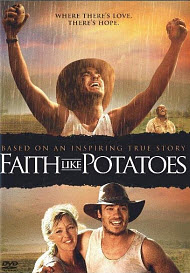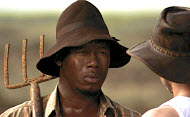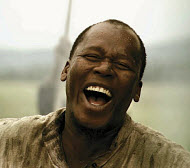Faith Like Potatoes
 for some thematic material, an accident scene, mild language, and brief smoking.
for some thematic material, an accident scene, mild language, and brief smoking.
Reviewed by: Shawna Ellis
CONTRIBUTOR
| Moral Rating: | Good |
| Moviemaking Quality: |
|
| Primary Audience: | Adults Teens |
| Genre: | Christian Drama |
| Length: | 1 hr. 56 min. |
| Year of Release: | 2006 |
| USA Release: |
DVD: April 7, 2009 October 27, 2006 (shorter version released in South Africa) |










FEAR, Anxiety and Worry—What does the Bible say? Answer
political unrest and racially charged land reclaims in Zambia
starting a new life in a different land
facing challenges, hardships and personal turmoil
becoming consumed by anger, fear and destruction
RACISM—What are the consequences of racial prejudice and false beliefs about the origin of races? Answer
ORIGIN OF BAD—How did bad things come about? Answer
Did God make the world the way it is now? What kind of world would you create? Answer
| Featuring |
|---|
|
Frank Rautenbach … Angus Buchan Jeanne Wilhelm … Jill Buchan Hamilton Dlamini … Simeon Sean Cameron Michael … Fergus Buchan Casper Badenhorst … Koos Matthew Roberts … Percy Hawkins Anton Treurnich … Steyn Candice D’Arcy … Joanne Morné Theunissen … John Rochelle Buchan … Morag Regardt van den Bergh … Pastor |
| Director |
|
Regardt van den Bergh |
| Producer |
|
Global Creative Studios (South Africa) Kirstin Barwise … line producer Frans Cronjé … producer |
| Distributor |
| Affirm Films, Sony Pictures Home Entertainment and Carmel Entertainment Group |
“Faith Like Potatoes” is based on a true story, and it is truly the story of a transformed life. In Angus Buchan, we see a man moving from self-reliance and turmoil to a life of submission to God and dynamic faith. This journey makes for a raw and gripping story, beautifully shot and artfully acted, especially by lead actor Frank Rautenbach. I am surprised that more people do not know about this film. Although primarily about a man’s faith journey, it delves into many relevant topics: anxiety, racism, suffering, grief, and more.
The movie opens in Zambia, South Africa, at a time of racial unrest. We meet Angus Buchan, a white farmer of Scottish heritage who is facing an uncertain future as he wrestles with the decision to move his family to another land and start a new farm from the ground up in Kwa-Zulu Natal. “I’ll make it work!” he tells his wife Jill. And he does try to make it work, relying only on himself, some hired workers he does not respect, and a Zulu foreman he does not trust. Angus is a passionate man, but his passion and zeal are misplaced.
The Buchan family’s new farm is named “Shalom” by his wife Jill, who seems to be a woman of gentle spirit and faith. But life is far from peaceful at Shalom Farm, and things quickly begin spiraling out of control in his life and marriage. Racial unrest is also at work in this area. Angus is exhausted, over-worked, anxious and despairing. He makes me think of the man toiling after the wind in Ecclesiastes:
.“And what profit has he who has labored for the wind? All his days he also eats in darkness, And he has much sorrow and sickness and anger” (Ecclesiastes 5:16-17).
All of his strivings do not bring peace. He lashes out at his workers and even his wife, seeking solace in alcohol at a local polocrosse club. He is a man bearing a heavy load, trying to bear it alone. He does not yet know that there is One who can help bear this burden. Jesus tells us,
“Take My yoke upon you and learn from Me, for I am gentle and lowly in heart, and you will find rest for your souls. For My yoke is easy and My burden is light” (Matthew 11:30).
But Angus is not open to the things of God, even at the gentle urging of this wife.
All of this changes when Angus hears the testimonies of men at a church meeting… a meeting he attends only with great reluctance. Although we do not hear the full gospel presented, it is obvious that the speakers are giving valid testimonies of lives changed through Jesus Christ. Angus is stirred, and we see that he has memories of hearing about this same Jesus as a child. It is wonderful to see such conviction in the face of a person who is being moved by the Spirit to accept the word of truth!
More wonderful, though, is seeing the changed life of this man after he comes to Christ. One can see that the weight of worry and despair has tangibly lifted and that Angus has been made into a new man.
“Therefore, if anyone is in Christ, he is a new creation; old things have passed away; behold, all things have become new” (2 Corinthians 5:17).
I have never seen a more vivid depiction of this sort of changed life in Christ than in this movie!
We see that even Angus” countenance is different, and we feel privileged to watch the transformation and to see where faith will take this new believer. All of Angus” troubles are still there… the racial turmoil still exists and the new farm takes up just as much time and energy, but now Angus is not facing these trials alone. He is earnestly seeking after God with all his heart. He is still a passionately wild Scotsman, but now he is a wild Scotsman for God.
I like what his pastor says: “God loves wild men who are excited about Him.” This pastor tells him of men like King David and the apostles “who have turned the world upside down” (Acts 17:6). He encourages Angus to go out and immediately start sharing about what has happened in his life, and Angus begins an adventure of bringing people together to tell them what God can do.
 Stumped about how to share your faith in Christ with others? Our EffectiveEvangelism.com site assists Christians in effectively reaching out to others with love and truth. Learn about the worldview of the people you meet, ways to share the gospel, read stories submitted by site users, and more.
Stumped about how to share your faith in Christ with others? Our EffectiveEvangelism.com site assists Christians in effectively reaching out to others with love and truth. Learn about the worldview of the people you meet, ways to share the gospel, read stories submitted by site users, and more.
One thing I truly appreciate in this movie that seems lacking in many other Christian films is that the Bible is central to Angus’ new faith. He seems to devour the Bible like a starving man, using the Bible and prayer to find God’s will. It is quite refreshing to see a man reading, quoting, and praying God’s Word in a very real way. His unique method of having “quiet time” on his farm is especially enchanting.
We see an instant change in Angus’ relationships. He allows his sweet wife to be the helpmeet she desires to be. His family relationships are strengthened. He soon comes to trust and rely on his foreman Simeon Benghu (played wonderfully by Hamilton Dlamini). The growing friendship between these men is wonderful to behold, as is Simeon’s slowly developing faith as he observes Angus. We see the Buchan family reaching out to the Zulu community with love in a special way, and Angus eventually refers to himself as a “white Zulu” who looks at the black Zulus as brothers and sisters. This is a huge change from his initial distrust of the Zulu people.
A series of miraculous events begins taking place as Angus trusts in God for all things. In every amazing event in Angus’ life, he does not hesitate to give God the thanks and glory, and is quick to say, “God did this!” He believes that if God has the power to transform a life like his, God has the power to do anything. And Angus does not just believe this in his head, he lives it out and has a powerful testimony.
Over a period of time, his faith grows and grows, but is soon tested by an unthinkable family tragedy. Will Angus still believe and follow God’s purpose? Can he introduce people to the God who can change hard hearts, heal racial turmoil and bring rain to a dry land, all by faith? The Bible tells us that faith is “…the substance of things hoped for, the evidence of things not seen” (Hebrews 11:1). A huge test of Angus Buchan’s faith vividly demonstrates this to the viewer, and shows us why it is important to have faith like… of all things… POTATOES!
Although this is indeed a wonderful story which unabashedly gives glory to God and which uplifts the name of Jesus, I had to give it only a “good” moral rating because of some disturbing content. Likewise, I had to list violence as “moderate.” This was not due so much to violence in the usual sense of the word, but because of a particularly graphic accident scene.
Before Angus’ conversion, he is a belligerent and volatile man. He attacks a man in the street for little reason. He treats his hired native workers with utter disrespect, often calling them “bloody idiots” and threatening them. He and his wife have a heated argument about the possibility of using tranquilizers to help Angus, in which she pushes him, and he drives away angry. We hear radio broadcasts referring to murdered and assaulted farmers in the area.
Some of the men at the polocrosse club are negative influences, and one especially promotes racial discrimination. Angus smokes and drinks, even to the point of vomiting, at this club before he is converted.
Before becoming a believer, he uses the term “bloody” as a curse several times, often coupled with disparaging terms like “idiot” and “moron.” In one instance he says “hell no.” I appreciate that there is a marked difference in habits between the “old Angus” and the “new Angus,” and that to demonstrate the change the filmmakers must show us this negative glimpse of the old self. Toward the end of the film there is a use of “hell” in reference to the place, saying that (a weather phenomenon causing drought) “can go to hell, because that’s where it belongs.” Other than this, there is no other cursing that I could hear, and no misuse of God’s name.
Although there is no sexual content, aside from a few kisses and embraces between the married main couple, there are some extended images of shirtless men (including some Zulus and Angus). Jill Buchan generally wears covering clothing, but at times she wears tank tops which are a bit form fitting (yet this did not at all seem to be with the intent of immodesty). This is very mild.
There are a few disturbing images. A very sick bull is shown, and later we hear a gunshot which implies it has been put down. Angus kills a wild pig offscreen, and we see it’s body and some blood on his shirt where he had been carrying it. A Zulu woman has been struck by lightning, and we see her laid out in a smoke-filled room. Angus is burned on the arm during a fire.
But of greatest concern in this film is a graphic and extended accident scene. It is absolutely the most raw and realistic depiction of an accident which I have ever viewed. This is a pivotal and important scene, but should absolutely NOT be watched by young viewers, those who are squeamish about blood, or those for whom disturbing images linger in the mind. It is the reason my husband has chosen not to view this film again. There is no warning that the accident is about to occur, but anyone who wishes to avert or cover his or her eyes will have a moment in which to do so before too much is shown, and then can listen to the scene while avoiding the disturbing imagery. I do not recommend that the viewer fast forward through or skip this scene entirely, as it is very important to the film and the latter part contains some of the best acting in the entire movie.
Some may think I am over-stating the harshness here, but I just want to warn sensitive viewers. What has been seen cannot be unseen, and it would be better to be forewarned about this graphic depiction of an unthinkably sad event which really occurred in Angus Buchan’s life. It is all the more tragic because we know it really happened, and I found myself weeping and emotionally drained after watching it.
Why does God allow innocent people to suffer? Answer
What about the issue of suffering? Doesn’t this prove that there is no God and that we are on our own? Answer
Does God feel our pain? Answer
The part of the film following this life-changing event shows Angus struggling with anger and guilt for some time, while various family members grieve in other ways.
As for moviemaking quality, this is actually quite good. It does not carry the marks of a low-budget production, and has beautiful cinematography and lighting. The acting is top-notch. The score is a wonderfully stirring blend of orchestra and Zulu music and voices, as well as a very nice song at the end which was written for the film.
Despite the concerns which were listed above, this movie is a well-made, wonderful testimony to God’s power in the life of a man and his family. I believe that this film has stayed very close to the life and experiences of the “real” Angus Buchan, and in watching the special features I learned that he was actually on set daily and an active participant in the process.
I feel that this is a relevant story for believers and unbelievers alike. Those who do not yet believe may be stirred by seeing the awesome power of God in a real man’s life, even through hardship and suffering. If you are an individual who doubts the transforming power of God, please watch this film with an open mind and remember that this is the story of a real man. If you find yourself wanting to know more about this God and how He has made a way to save you, please seek out the resources regarding salvation here at this Web site.
 Discover God’s promise for all people—told beautifully and clearly from the beginning. Discover The HOPE! Watch it on Christian Answers—full-length motion picture.
Discover God’s promise for all people—told beautifully and clearly from the beginning. Discover The HOPE! Watch it on Christian Answers—full-length motion picture.
Without doubt this is a film which can encourage Christians to be wildly passionate about God. If you are a Christ-follower who has grown lukewarm in your love and service to the Lord, watch this film and be moved to action. Remember also that it was the heartfelt testimonies of men who had experienced salvation which God used to change Angus” heart… we must share our testimony! We may not see some of the miraculous happenings which Angus Buchan has experienced, and we may never speak to thousands in huge stadiums. But, we are told that…
“…whatever you do, do it heartily, as to the Lord and not to men, knowing that from the Lord you will receive the reward of the inheritance; for you serve the Lord Christ” (Colossians 3:23-24).
Violence: Moderate / Profanity: Minor / Sex/Nudity: Minor
See list of Relevant Issues—questions-and-answers.


The movie (in relating this true story) does not exclude the darker or tragic events surrounding the, nor does it water down the family’s hardships including poverty, the husband’s depression and temper struggles with other workers and villagers, and alcohol use. It shows also that he and his wife are caring patient with each other no matter the issues or surprises, although they understandably are visibly stressed and discouraged during the first half of the picture.See all »
Moral rating: Good / Moviemaking quality: 4
Then came the strong performance of the central character, played with great power and commitment by South African Frank Rautenbach. His is a world-class tour de force with many difficult emotive scenes played with gusto. The Zulu Africans also came across with conviction (all bar a couple of the smaller roles) Director/screenplay writer Regardt van den Bergh acquits himself well in bringing this based on fact, faith-based story to surprisingly vivid life. While set around the tragic turmoil of the Apartheid years, this is not the movie’s main focus. It features an above-average soundtrack score, with a stand-out main song written and performed by South African artist Joe Niemand.
Taken from Angus Buchan’s autobiographical book and photographed on his farm, it follows the life of an angry young small-time farmer and his young family, as they battle the land and assorted family emotional situations. The screenplay doesn’t always convey some plot elements as clearly as it should, but the rather riveting story never the less holds interest throughout. Those not interested in faith based situations won’t get the significance of some actions, while others will be suitably inspired by the changes in Buchan’s personality and the very real benefits he eventually brings to those around him. Well worth a look, and proves what can be done on a limited budget with full commitment from all involved.
Moral rating: Good / Moviemaking quality: 4½
Moral rating: Good / Moviemaking quality: 4½
Positives: The acting and cinematography are good. The sets are realistic and interesting. More importantly, the change in Angus’ life after his salvation is good and perhaps the most commendable aspect of the movie. Before salvation, he’s pretty much a jerk. He has a very bad temper, he drinks and smokes, he rejects all mention of God, he is rather racist, and tries to do everything alone. After salvation, he becomes gentle, passionate about his faith, loves to read the Bible and pray, and sees those of other ethnic groups as his brothers.
Negatives: Many of the events in the story seem a bit disconnected, like a series of events in the same location rather than as a recognizable plot. There are several incidents of smoking and drinking, especially before Angus’ salvation, but there is one scene where Angus is shown drinking alcohol even after his salvation (though he is a brand new believer at the time). Obviously they are setting him up for a changed life afterward, but it’s hard to watch. The accident scene is very graphic with a lot of blood and is very hard to watch. Also much of the movie implies a “name it and claim it” theology, with verses used out of context in the sloppy theology that is unfortunately all too common these days.
Overall, it’s not too bad as movies go. But I don’t think it deserves the praise I’ve heard of it.
Moral rating: Better than Average / Moviemaking quality: 4
Moral rating: Offensive / Moviemaking quality: 2½
PLEASE share your observations and insights to be posted here.


My Ratings: Moral rating: Good / Moviemaking quality: 4